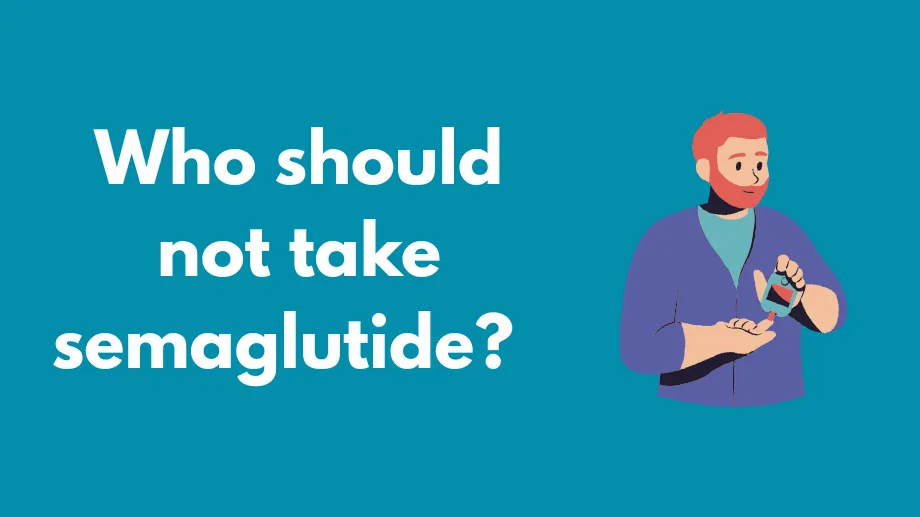Who should not take semaglutide?

Semaglutide is a prescription medication marketed under the brand names Wegovy, Ozempic, and Rybelsus. Wegovy and Ozempic are given as weekly subcutaneous injections in the abdomen, thigh, or upper arm. Rybelsus is a once‑daily oral tablet.
Wegovy is FDA‑approved for weight loss in patients with obesity and at least one weight‑related condition (for example, high blood pressure or type 2 diabetes). Ozempic and Rybelsus are approved to control blood sugar in adults with type 2 diabetes (T2DM). Ozempic also reduces the risk of major cardiovascular events in T2DM with heart disease. Both Ozempic and Rybelsus are used off‑label for weight management.
Although generally well tolerated, semaglutide should not be taken by certain individuals:
- Anyone allergic to semaglutide or any inactive ingredients in the product
- Those with a personal or family history of medullary thyroid carcinoma (MTC) or Multiple Endocrine Neoplasia syndrome type 2 (MEN 2)
- Women who are pregnant or planning pregnancy (stop semaglutide at least 2 months before conception)
- Breastfeeding women (discuss risks if taking Wegovy or Ozempic; Rybelsus is not recommended during breastfeeding)
- Patients with type 1 diabetes or diabetic ketoacidosis
- Those with:
- Kidney disease
- Pancreatitis
- Diabetic retinopathy
- Stomach or intestinal disorders
Semaglutide FAQs
What Happens to the Body When Taking Semaglutide?
Semaglutide is a GLP‑1 receptor agonist. It binds to GLP‑1 receptors, stimulating insulin release from the pancreas, reducing liver glucose output, and slowing gastric emptying. These effects lower blood glucose and reduce appetite, supporting weight loss.
What Are the Possible Side Effects?
Common side effects across all semaglutide products include:
- Nausea
- Stomach pain, heartburn, diarrhea, constipation
- Vomiting
- Bloating
- Loss of appetite
- Low blood sugar
- Fatigue
- Injection site reactions (Wegovy and Ozempic)
- Headache
- Cold or flu-like symptoms
- Dizziness
Serious side effects, though rare, may include:
- Allergic reactions (hives, facial/throat swelling, shortness of breath)
- Thyroid tumors (MTC or MEN 2): lump in neck, hoarseness, difficulty breathing or swallowing
- Pancreatitis: severe upper abdominal pain radiating to the back, increased heart rate, nausea
- Diabetic retinopathy complications: vision changes
- Severe hypoglycemia: sweating, blurred vision, dizziness, confusion, rapid heartbeat
- Kidney problems: decreased urination, thirst, dry skin
- Gallbladder issues: fever, clay‑colored stools, upper abdominal pain
These are not all possible side effects. Seek medical advice for any concerns and report adverse reactions to the FDA at 1‑800‑FDA‑1088 or www.fda.gov/medwatch.
What Medications Should Not Be Taken with Semaglutide?
Semaglutide may interact with:
- Diabetes medications (insulin, sulfonylureas, metformin)
- Oral medications affected by delayed gastric emptying
Always inform your provider about all prescription and over-the-counter drugs, vitamins, and supplements you take.
What If I Miss a Dose?
For Rybelsus: skip the missed dose and take the next dose at the scheduled time.
For Ozempic and Wegovy: take as soon as remembered, then resume the regular schedule. If the next dose is due within 48 hours, skip the missed dose.
How Do You Store Semaglutide?
Rybelsus: store at room temperature (68–77°F / 20–25°C) in the original package, away from moisture.
Ozempic: store unopened pens in the refrigerator (36–46°F / 2–8°C). After first use, store at room temperature (59–86°F / 15–30°C) or refrigerated (2–8°C) for up to 56 days.
Wegovy: store unopened pens in the refrigerator (36–46°F / 2–8°C). May be stored at room temperature (46–86°F / 8–30°C) for up to 28 days if unused. Discard if frozen, exposed to light or >86°F, or kept >28 days.
What Happens if a Non‑Diabetic Takes Semaglutide?
Semaglutide is approved for obesity in non‑diabetic patients. It can reduce appetite and support weight loss. Side effects are similar to those seen in diabetes patients, mostly mild and gastrointestinal. Seek medical attention for serious or persistent side effects.
